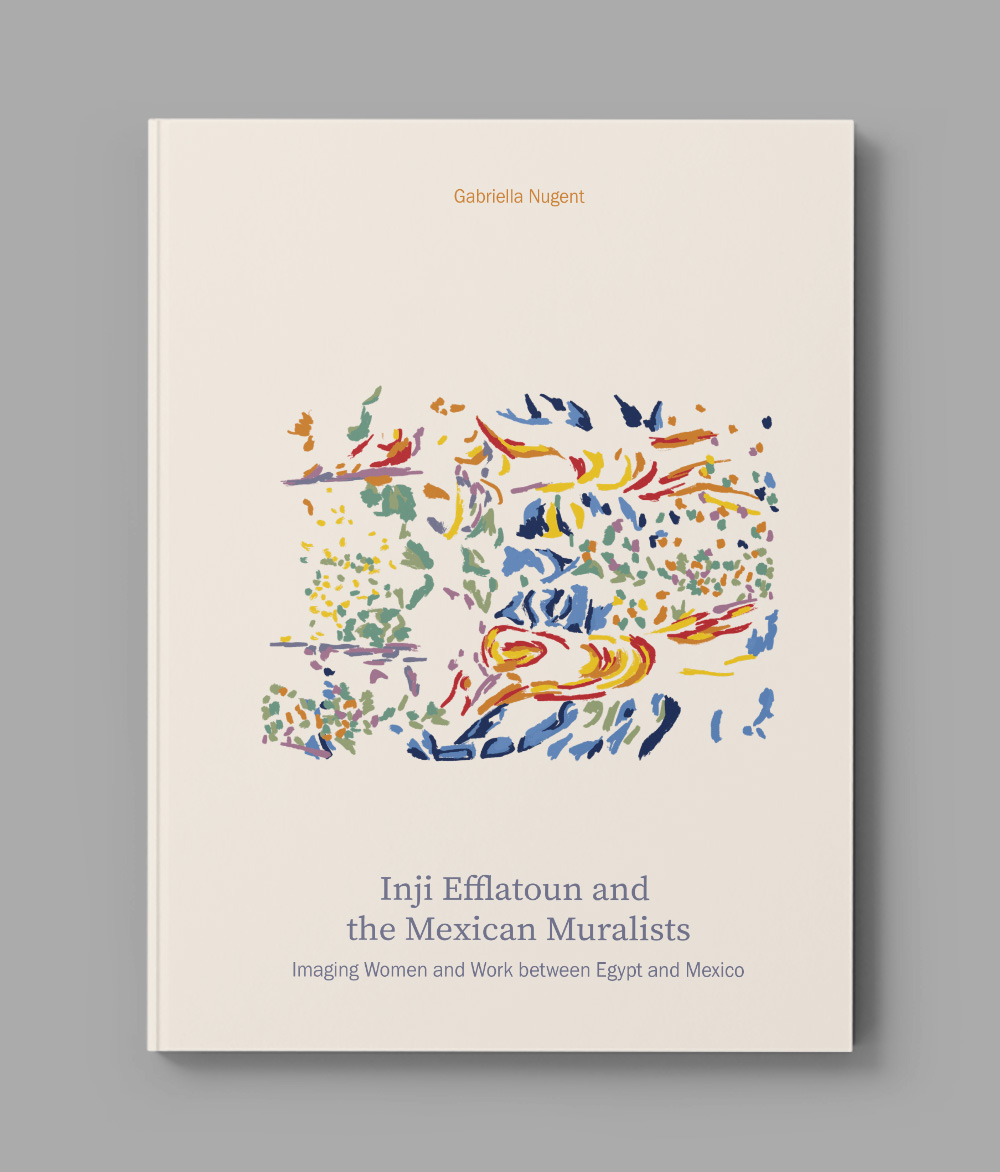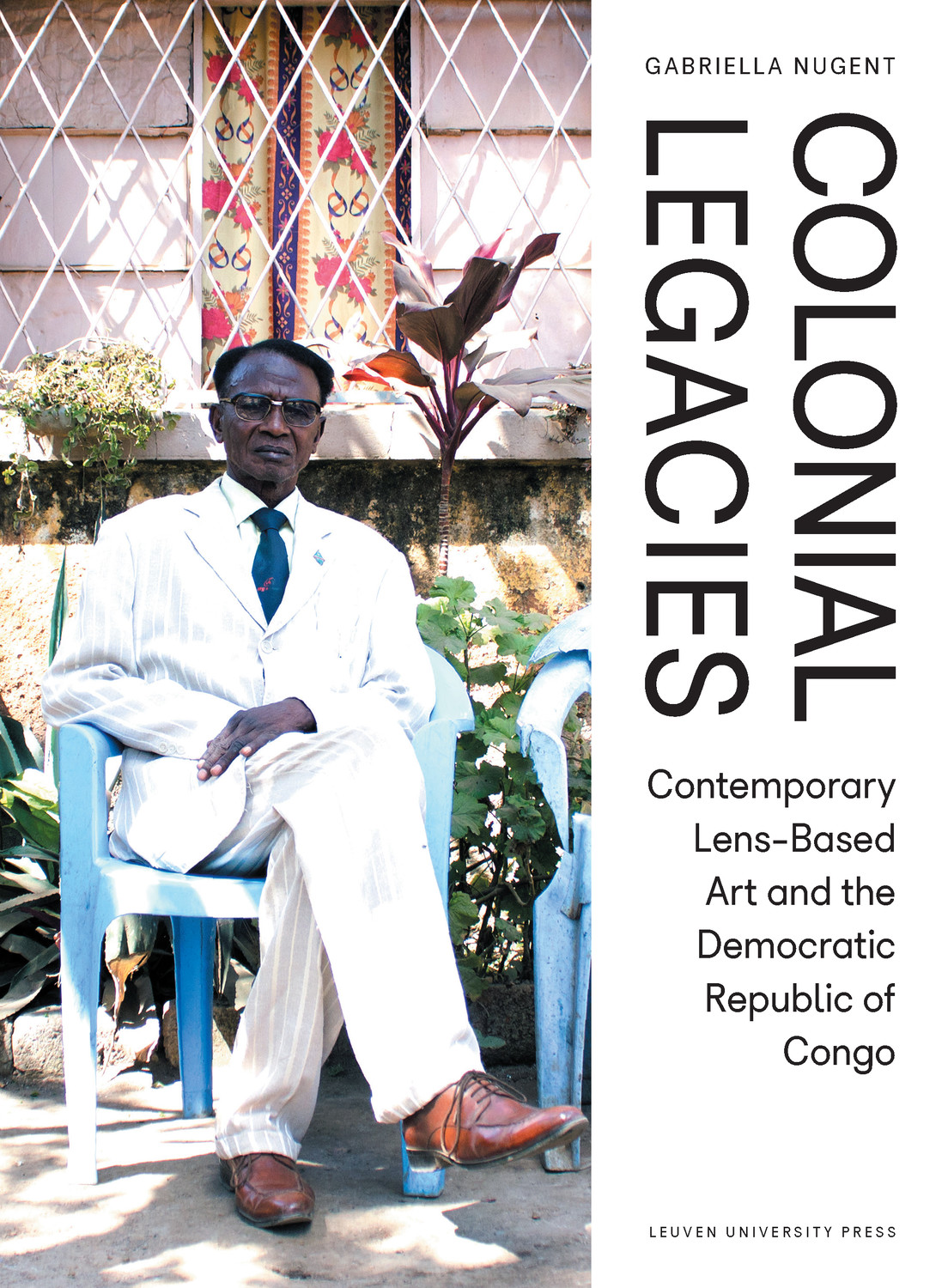
Gabriella Nugent's Inji Efflatoun and the Mexican Muralists: Imaging Women and Work between Mexico and Egypt explores how Efflatoun, an Egyptian artist, communist and activist in the women's movement, adopted the language and philosophy of Mexican muralism to address the modern political situation in Egypt. This essay traces Efflatoun's relationship with key figures in the Mexican mural movement, including David Alfaro Siqueiros, Diego Rivera and José Clemente Orozo, and explores the ways in which she challenged the masculinist assumptions of artistic modernism.
Learn more at Sharjah Art Foundation

Colonial Legacies:
Contemporary Lens-Based Art and the Democratic Republic of Congo
In Colonial Legacies, Gabriella Nugent examines a generation of contemporary artists born or based in the Congo whose lens-based art attends to the afterlives and mutations of Belgian colonialism in postcolonial Congo. Focusing on three artists and one artist collective, Nugent analyses artworks produced by Sammy Baloji, Michèle Magema, Georges Senga and Kongo Astronauts, each of whom offers a different perspective onto this history gleaned from their own experiences. In their photography and video art, these artists rework existent images and redress archival absences, making visible people and events occluded from dominant narratives. Their artworks are shown to offer a re-reading of the colonial and immediate post-independence past, blurring the lines of historical and speculative knowledge, documentary and fiction. Nugent demonstrates how their practices create a new type of visual record for the future, one that attests to the ramifications of colonialism across time.
Reviews:
“This book constitutes an outstanding contribution to the study of contemporary African art and historiography of the DRC. In its painstaking analysis of past and present images, it offers a timely analysis of Congolese culture and politics.”
- Pierre-Philippe Fraiture, French Studies (February 2023)
"... the book’s forte lays in the author’s careful method of close reading. Nugent rightfully prides herself for her attention to visual details. She reads artworks both along and against the grain, by zooming in on images, paying attention to their materiality, tracking their transformations and alterations, looking at the margins. Her book’s argumentative power also comes from its careful consideration of the historical scholarship on the Congo, as well as its rich theoretical apparatus. These foundations enable Nugent to contribute both to Congolese studies and to current scholarly conversations, on questions including visuality, memory, violence, technopolitics, and the body ... the book offers a highly stimulating study of critical artistic interventions ... It will appeal to readers interested in Congolese history, contemporary art, photography, and the making of new archives for the present."
- Pedro Monaville, African Arts (June 2023)
“The real heart of this book, which makes an interesting contribution to the study of a highly dynamic contemporary Congolese art scene, lies with its delicate unpacking of the past futures the art under discussion renders visible.”
- Sarah Van Beurden, H-France Review (August 2023)
“...le présent ouvrage mérite bien des éloges, en raison du regard fascinant et original qu’il porte sur l’art contemporain congolais. Il comble un manque, ouvre et éduque notre regard, tant et si bien qu’on peut le considérer comme une lecture indispensable à la compréhension des tendances qui prévalent actuellement chez les vidéastes et les photo- graphes congolais. G. Nugent a choisi les œuvres commentées avec beau- coup d’à-propos, elle les analyse avec finesse et intelligence, et établit entre elles des liens pertinents. L’érudition dont elle fait montre n’exclut pas un style limpide, propre à captiver son lecteur. Nous ne pouvons donc qu’es- pérer que ce livre sera traduit en français afin de toucher un plus vaste public en Europe et en Afrique.”
- Thérèse De Raedt, Études littéraires africaines (October 2023)
“Colonial Legacies... makes a compelling argument about how art provides a way to open discussions about the complex and lasting effects of colonial violence... Colonial Legacies invites readers to pay close attention to the ‘Futures that never arrived, but were once imagined’ and how they continue to ‘glimmer’ in the works of contemporary visual artists, which, as Nugent writes, help us to ‘see both the past and present anew’.”
- Kylie Thomas, Low Countries Historical Review (February 2024)
Learn more at Leuven University Press (EU/UK) or Cornell University Press (US)
Contemporary Lens-Based Art and the Democratic Republic of Congo
In Colonial Legacies, Gabriella Nugent examines a generation of contemporary artists born or based in the Congo whose lens-based art attends to the afterlives and mutations of Belgian colonialism in postcolonial Congo. Focusing on three artists and one artist collective, Nugent analyses artworks produced by Sammy Baloji, Michèle Magema, Georges Senga and Kongo Astronauts, each of whom offers a different perspective onto this history gleaned from their own experiences. In their photography and video art, these artists rework existent images and redress archival absences, making visible people and events occluded from dominant narratives. Their artworks are shown to offer a re-reading of the colonial and immediate post-independence past, blurring the lines of historical and speculative knowledge, documentary and fiction. Nugent demonstrates how their practices create a new type of visual record for the future, one that attests to the ramifications of colonialism across time.
Reviews:
“This book constitutes an outstanding contribution to the study of contemporary African art and historiography of the DRC. In its painstaking analysis of past and present images, it offers a timely analysis of Congolese culture and politics.”
- Pierre-Philippe Fraiture, French Studies (February 2023)
"... the book’s forte lays in the author’s careful method of close reading. Nugent rightfully prides herself for her attention to visual details. She reads artworks both along and against the grain, by zooming in on images, paying attention to their materiality, tracking their transformations and alterations, looking at the margins. Her book’s argumentative power also comes from its careful consideration of the historical scholarship on the Congo, as well as its rich theoretical apparatus. These foundations enable Nugent to contribute both to Congolese studies and to current scholarly conversations, on questions including visuality, memory, violence, technopolitics, and the body ... the book offers a highly stimulating study of critical artistic interventions ... It will appeal to readers interested in Congolese history, contemporary art, photography, and the making of new archives for the present."
- Pedro Monaville, African Arts (June 2023)
“The real heart of this book, which makes an interesting contribution to the study of a highly dynamic contemporary Congolese art scene, lies with its delicate unpacking of the past futures the art under discussion renders visible.”
- Sarah Van Beurden, H-France Review (August 2023)
“...le présent ouvrage mérite bien des éloges, en raison du regard fascinant et original qu’il porte sur l’art contemporain congolais. Il comble un manque, ouvre et éduque notre regard, tant et si bien qu’on peut le considérer comme une lecture indispensable à la compréhension des tendances qui prévalent actuellement chez les vidéastes et les photo- graphes congolais. G. Nugent a choisi les œuvres commentées avec beau- coup d’à-propos, elle les analyse avec finesse et intelligence, et établit entre elles des liens pertinents. L’érudition dont elle fait montre n’exclut pas un style limpide, propre à captiver son lecteur. Nous ne pouvons donc qu’es- pérer que ce livre sera traduit en français afin de toucher un plus vaste public en Europe et en Afrique.”
- Thérèse De Raedt, Études littéraires africaines (October 2023)
“Colonial Legacies... makes a compelling argument about how art provides a way to open discussions about the complex and lasting effects of colonial violence... Colonial Legacies invites readers to pay close attention to the ‘Futures that never arrived, but were once imagined’ and how they continue to ‘glimmer’ in the works of contemporary visual artists, which, as Nugent writes, help us to ‘see both the past and present anew’.”
- Kylie Thomas, Low Countries Historical Review (February 2024)
Learn more at Leuven University Press (EU/UK) or Cornell University Press (US)